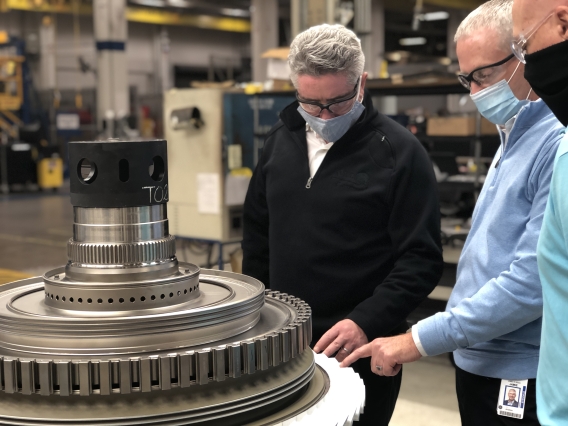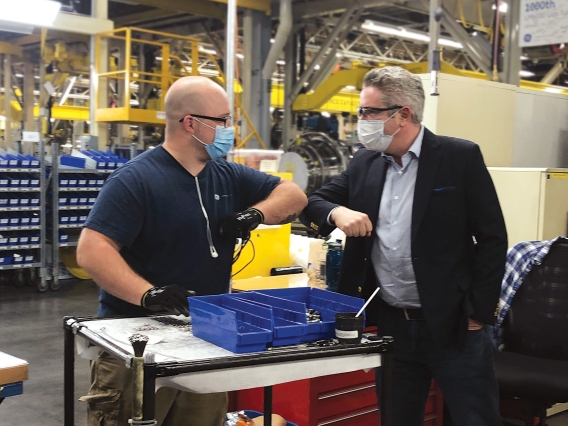CEO and President of GE Aviation John Slattery feels that UL can be at the heart of aviation recovery and the industry's future.
“Right now, as an industry, we are going through an unprecedented reset.”
The opening words of John S Slattery, the proud Irish man and University of Limerick alumnus heading up General Electric’s aviation unit as its president and CEO, its key aircraft engines division, as the global industry grapples with disruption caused by the Covid-19 pandemic.
For context, GE Aviation is the largest manufacturer of aircraft engines in the world – for example a GE powered aircraft takes off somewhere in the world every two seconds
Speaking via video conferencing from his Cincinnati office, John is quick to explain that an “enormous reset on production and servicing requirements” has occurred.
“Furthermore, we are as a collective industry, struggling to find fidelity around the forecasts into next year and what those might look like because we are dealing with a virus that is proving to be uniquely challenging as we plan our businesses.”
The Ennis native wouldn’t be the first business leader to say their industry is facing enormous challenges as a result of the pandemic, but it’s generally accepted the aviation business has been hit particularly badly.
“COVID has been brutal and I think as a leader you have to have empathy with your employees, but you can’t sugar coat anything either. And, I’m not talking just financially or in business, it’s recognising what is going on in people’s lives, the stress on them and their families.
“At each town-hall I hold, I simply ask everyone to look out for one another because you never know the difficulties people are going through and I would encourage everyone reading this to do that too – so easy to do and if heartfelt can make a big difference.
“That being said, as sure as night follows day, this business, this industry and its people will recover.
“All we are trying to figure out now is the cadence around which that recovery materialises – as I need to be sized accordingly – when the market returns – it may be in a surge mode,” he adds.

Cue the opportunity and John Slattery believes that there is a broader industry reimagining presenting itself, one that education and University of Limerick can be at the heart of for Ireland.
One of the silver linings or the outputs of COVID is the broad realisation that as the industry and the original equipment manufacturers in particular must radically reset. Today is an opportunity for the industry and the stakeholders that support the industry, to figure out how we can be a more environmentally friendly going forward.”
To that end, GE Aviation is looking to its fuel burn efficiency and its correlation to CO2, NOx and noise emissions.
“We have just certified the largest commercial engine in the world; the GE9X and pound for pound it is the most environmentally friendly engine ever developed. It’s actually in the Guinness Book of Records.”
“So, right now what I’m looking for, and I will need support from the academic institutions when we think of the talent pipeline, is talent to come through the universities and the schools to funnel into GE Aviation in the years ahead as we chart our own path of a decarbonised world. GE has actually just committed to being carbon neutral by 2030.
Whilst we have a lot of initiatives on our plate, fresh thinking will come from the universities and indeed I can say with some obvious bias that the University of Limerick is in a strong position to play a pivotal part.
Ireland is in a unique position to do that according to the US based CEO who notes that the country’s reputation on the global stage when it comes to commercial aviation “is almost unparalleled”.
“The only thing Ireland lacks today, if you are to be ruthlessly honest, is a broader and deeper Original equipment manufacturer presence on the island.
"However, when you think about the air traffic control space that the Irish Aviation Authority manages, in conjunction with EUROCONTROL run by another proud Irish man Eamon Brennan, when you think about the footprint of aircraft lessors from around the world that own 45 per cent of the world’s fleet and the majority of whom are headquartered in Ireland and Shannon, Limerick, Dublin.
Also when you think about the diaspora that have gone around the world as we have many Irish executives in airlines around the world as far away as Australia, it’s hard to challenge the unparalleled status.

“There is a level of uniqueness in the Irish universities, and certainly UL in having a dedicated aeronautical engineering centre of excellence coupled with the commitment over at the Kemmy Business School through the MBA and the dedicated aviation modules, as well as what is happening at other Irish universities, shows that Ireland is punching significantly above her weight when it comes to our commitment to aviation and the ability to influence it not only in Ireland but around the world.
What I have been impressed with in UL, since the NIHE days, is that UL pays attention to the ‘voice-of-the-customer’ and doesn’t just embrace an academic pursuit in its own right.
John is keenly aware that UL is there to bring tangible and realizable value to the industries that it supports, locally, nationally and frankly globally.
“I am a product of UL and I don’t live in Ireland, but the fact that UL is very focused from that original lineage of NIHE in paying attention to the customer, refining and continuously improving courses to ensure that they are scratching the itches of what industry is looking for, is key and a real differentiator for the university.
“UL has always distinguished itself by being relevant in the market – its why the graduating classes are always in demand.
“Agility is in the DNA of UL and expressed through the academic staff. I have had the opportunity to talk to and stay connected with some of the staff even since I have left UL, their profound commitment to be relevant in the market coupled with the humility to always ask the questions of “are we being relevant and if not, where is it that we should adapt”.
“If you have to pivot and change, then that is what you have to do. It’s what UL does as its programs adapt over the years to remain relevant. UL taught me that ability also and it has served me well.
“While I live in Ohio, I still have a home in Ennis, and I love spending those precious few nights a year there – the West is where I am from and will always be home. Unfortunately, I get home less and less now, but I will never consider myself an outsider.
“The West of Ireland has unique opportunities and challenges and I have always hoped to see the development and growth of Shannon Airport. As a proud Irishman living abroad, I am always encouraging people to travel to Ireland and go to the West and fly in and out of Shannon.
“I am looking at here in Cincinnati where we are in the middle of the United States and Amazon is going to put a major hub and logistics centre and I often wonder if something like that could work in the West of Ireland and even near where UL is. With hubs it’s possible, because all you are doing is connecting the dots with airbridges.
“However, when you are dealing with a part of the world with a smaller catchment area and smaller population, you are always going to have unique headwinds and challenges in developing the airport,” he adds.
Crediting the work of the leadership team at Shannon, John Slattery believes that the airport needs to evolve for the region to thrive. Expecting it to become a major passenger airport anytime soon is unrealistic he said.
Therefore, creating a cluster of other businesses around Shannon that are aerospace related and served by education and training has been “insightful”.
There should be an exploration of “ways to harness all of the unique energies to bring value to the West”, John argues.
“The airport is a magnificent piece of real estate and positioned beautifully on the periphery of Europe and I believe there is a place for Shannon so broadening the cluster of aviation related businesses is in everybody’s best interest,” he says.
It can be done “with a little imagination”, he believes .
Added to that, John feels that UL, “rooted on academic excellence and an ability to focus the lens of academia on the requirements of business and industry, is somewhat unique.”
UL has a diaspora today that run some of the biggest companies in the world and its academic staff, are in my humble opinion world class.
"Their ability to both challenge and support the students, to get the best out of the student when they are there, but also to be part of the story and their journey after they leave, is something very special.”
A regular visitor to the UL campus when in the country, John says that staying connected with some of his former tutors and professors and dean allows him to “always come away with ideas - some of which are seeds and can take years to grow and blossom, but something that should never be underestimated.
“When you peel it all back, it’s about the DNA of UL, that passion in the teaching staff who rally around a noble cause of really taking care of the students and making them better people.
“They position students to bring value to the world when they go out into it after their education journey. It is not just about employability because the professors go beyond that. They want the students to be part of building a better world and to own that responsibility. That’s profound because there is no single class that teaches that – its osmosis!
“It is the fabric of UL and is evident in the myriad of conversations that former students continue to have with the professors afterwards. For me, I feel like when I walk away that ‘I just want to be better’ because that is how you are trained at UL and that is how we operate.
“That is why I have so much confidence and pride when I talk about UL and its place in the future.”
- Andrew Carey
